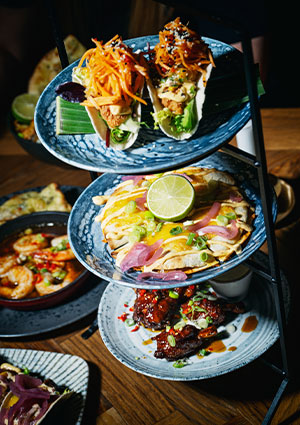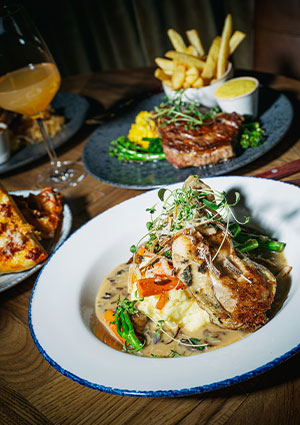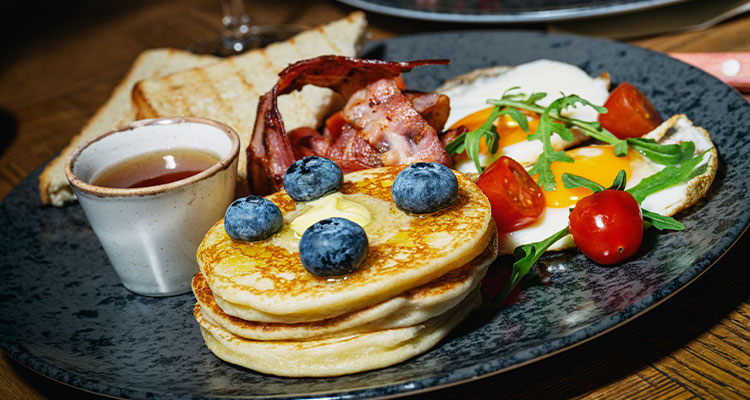With plans for steady expansion across Europe and beyond, Norrein Group remains a market leader by combining guest-driven insights with cutting-edge innovation
Best known for its acclaimed casual cuisine concept, Egon Restaurants, Norrein Group remains one of Norway’s foremost providers of hospitality accounting, operations, and marketing services. The company has a long history, spanning 40 years and two generations of leadership, as Chief Executive Officer, Dan Robert Halshamn, begins: “Egon Restaurants is owned and operated by Norrein Group, which was established in 1981. The company was formed by three founders with expertise in both finance and accounting, and hospitality services. Today, Norrein Group operates under its original leadership, with a second-generation of owners at the helm.
“We value our people very highly. All 25 of our administration employees are also partial owners, collectively holding 20 percent of the company. Additionally, managers and middle managers at our restaurants are employed for an average of nine and a half years, while employees in the restaurant and kitchen are employed for an average of around five years. This is far above the industry standard.
 “For the first 15 years, Norrein owned and operated a number of different concepts in nightclubs, fine dining restaurants, cafes, bars, and around 30 hotels. The first Egon Restaurant was established in 1984, and today there are 45 Egons in Norway and three in Sweden. All of Norrein’s other restaurant concepts and hotels have been sold, apart from one hotel and some other restaurant operations around Norrein’s head office in Trondheim, Norway. Selling the other concepts was a strategic choice to further focus on the Egon success story. Norrein Group, with Egon Restaurants, will have a turnover of approximately €210 million in 2025.
“For the first 15 years, Norrein owned and operated a number of different concepts in nightclubs, fine dining restaurants, cafes, bars, and around 30 hotels. The first Egon Restaurant was established in 1984, and today there are 45 Egons in Norway and three in Sweden. All of Norrein’s other restaurant concepts and hotels have been sold, apart from one hotel and some other restaurant operations around Norrein’s head office in Trondheim, Norway. Selling the other concepts was a strategic choice to further focus on the Egon success story. Norrein Group, with Egon Restaurants, will have a turnover of approximately €210 million in 2025.
“Egon Restaurants is an all-day casual concept with a large and varied international menu that ranges from steaks, pastas, and burgers to Asian cuisine and pizzas. Our concept is not unlike the American Cheesecake Factory. An average Egon Restaurant has a turnover of around €4 million, while the smallest ones have a turnover of around €2 million, and the largest €13 million. This makes Egon the market leader at all its locations. This is something we are very proud of, especially since Norway is our home market, and has a population of five million inhabitants.
“Norrein Group and Egon Restaurants annually have over 70 to 80 offers from various Norwegian and international landlords who want to sign a lease contract with us. Egon is a popular concept that attracts all age groups. It’s a place where everyone, regardless of the occasion, feels at home in the cozy environment.
“Some of the reasons why Egon is a sought-after tenant is that it does not have franchise restaurants but owns all the companies itself and has full control. Norrein Group is also a popular choice, since it’s not owned by short-term investors, such as PE funds, but instead has owners with long-term control over the business. The leases we sign are often for 20 to 40 years. Egon also has a steady and controlled growth rate, with only one to three new restaurants opening each year, and only in the best locations. On average the total cost of building a new Egon restaurant is €3 million to €4 million, and stakeholders consistently reap the rewards of investing with us.”
Unparalleled results
Forty years of success is no easy accomplishment. Dan Robert discusses how Norrein Group stays one step ahead: “We’ve been a market leader for over 40 years, and in that time, we’ve maintained continual growth, both in regard to our turnover and footprint. We produce strong financial results, year in, year out, and there are a number of reasons for this. Number one, our ownership team is local and close to the operation. We don’t operate a franchise model, instead, we focus on tight communication between everyone in administration and the management teams out in the restaurants. We also have a controlled growth rate, and a focus on innovation. Our strategies are based on what the market and our guests want, and a strong focus on cost throughout the entire operation. We also boast a very low turnover of employees, managers, and middle managers, as well as a high degree of implementation, which results in faster target achievement than our competitors.”
and in that time, we’ve maintained continual growth, both in regard to our turnover and footprint. We produce strong financial results, year in, year out, and there are a number of reasons for this. Number one, our ownership team is local and close to the operation. We don’t operate a franchise model, instead, we focus on tight communication between everyone in administration and the management teams out in the restaurants. We also have a controlled growth rate, and a focus on innovation. Our strategies are based on what the market and our guests want, and a strong focus on cost throughout the entire operation. We also boast a very low turnover of employees, managers, and middle managers, as well as a high degree of implementation, which results in faster target achievement than our competitors.”
Innovation is key to keeping Norrein Group’s dining concepts at the cutting-edge. As Dan Robert details: “Egon’s innovation strategy is based on insights from our six million annual guests. We collect data through a variety of digital feedback channels, as well as daily monitoring of the sales mix and regular visits to various large and innovative restaurant destinations in the USA, Europe, and Asia.
“It is one thing to have a constant development of the food and drink concept, but we also focus on the continual improvement of internal routines, efficiency, and digitization. We are looking to simplify both the guest experience and everyday working life for our employees. Egon also continuously invests in refurbishment and the expansion of existing restaurants, spending an average of €8 million to €15 million yearly.”
Over the next five to ten years, Norrein Group has big plans for further expansion. Dan Robert reveals what’s next for the business: “Fortunately we are not owned by a financial investor with a set expansion goal. Our internal goals are primarily to ensure quality and look after our existing management team and employees — and, through this, we generate increased turnover, and unparalleled results. This is a policy that has worked throughout the last 40 years, but both owners, administration, and employees also want to grow the number of units across Norway, Sweden, Denmark, Germany, and the UK. Eventually, we’d also like to expand into the US.
“We aim to open two to five new restaurants per year, over the coming years. When looking for new locations, we consider footfall as it exists currently, but we also undertake thorough research on how this location will develop in the next 15 to 20 years. We tend to favor landlords with a long-term perspective, people who we can work with closely to create destination dining experiences for our customers over the next two to four decades,” he concludes.
